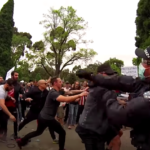Police Accused of Protecting Politicians

Damning allegations have emerged that senior officers within Victoria Police prevented detectives from arresting and prosecuting up to 16 members of the Andrews Government over the ‘red shirts rort’.
Red shirts rort
The ‘red shirts rort’ involves allegations that almost $400,000 in taxpayer identified by the Victorian Ombudsman as being misused via falsely signed timesheets for Labor field campaigners and organisers in the lead up to the 2014 state election.
‘Secret’ documents leaked
Documents from 2018 that were reportedly leaked to the media are said to reveal that detectives from the state’s fraud squad who were investigating the alleged rort became frustrated by the lack of cooperation by the members of parliament.
It is reported that, as a result, they urged their superiors to approve arrests, but were directed by high-ranking officers that the politicians were “not be arrested, photographed, searched if they are interviewed”.
The files are said to explicitly state that the intervention by senior police was to be kept secret.
It is further reported that detectives were discouraged from using traditional methods of investigation including raids, or arresting MPS with the aim of opening up new lines of inquiry, or to prompt suspects to cooperate.
Instead, more than a dozen former Labor staffers were questioned.
The leaked documents also suggest that detectives believed there was sufficient evidence to prosecute the politicians.
Victorian Attorney-General Jaclyn Symes has refused to comment on the saga, previously stating it “is a matter for police.”
Police as political attack dogs
Many Victorians however, smell a cover-up and want the rule of law to apply; that is, for politicians to be as accountable for alleged criminal offences as members of the general public.
Some has gone so far as to label police as ‘lapdogs’ and ‘attack dogs’ for members of parliament, and others in positions of power and influence.
This has long been the allegation levelled against specific units of police forces across Australia, perhaps most notably the ‘Fixated Person’s Unit’ in New South Wales which came under fire for arresting the producer for political satirists The Friendlyjordies, Kristo Langker, at the behest of former NSW deputy premier John Barilaro.
Criminal charges were brought against Mr Langker, which were withdrawn after Mr Barilaro had resigned from his office, and police were ordered to pay legal costs.
No comment by police
Recently, Victoria Police said it would not comment on the media reports, but confirmed it is assessing a fresh request to review the probe.
Diminishing confidence in police
Currently, there is a lot of discussion and debate about the lack of trust in Victoria Police – particularly on the back of the Lawyer X scandal, the heavy-handed policing during the Covid pandemic and the steady stream of footage of police brutality which makes its way into the public domain.
Certainly, the handling of this particular case, and the inference in the leaked documents that the MPs were to be treated very differently from other members of the public suspected of a crime, makes Victoria Police look like nothing more than puppet of the current government – a far cry from the independent organisation working on behalf of the taxpayers who fund it, that it is supposed to be.
Calls for IBAC Inquiry
But that’s only one problem that exists within a much broader issue, even despite calls for an investigation by IBAC – the Independent Broad-Based Anti-Corruption Commission.
Should IBAC decide to investigate, it only has the authority to make recommendations at the end of any inquiry. Any subsequent decision to prosecute would need to be made by the Department of Public Prosecutions. If there has been misconduct by Victoria Police, then in much the same way, recommendations can be made by IBAC, but Victoria Police will decide any applicable or appropriate consequences for officers.
The broader issue
The problem with inquiries – as much as they are important and warranted – is that they don’t tend to solve the clear lack of accountability that exists around the use of public funds in this country.
Over the past couple of years in particular there have been several high-profile instances involving misuse of public funds and pork barrelling at both Federal and State levels.
The cost of independent inquiries is in fact, just another taxpayer burden because without any real power or authority, they can only continue to highlight the inadequacies of current systems and processes around decision-making for public spending – and the sheer arrogance of politicians who continually shirk their public responsibility to make these decisions with impeccable integrity.







